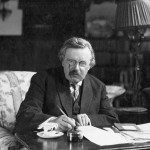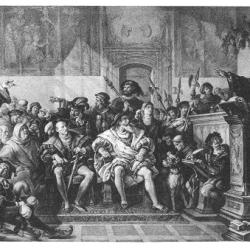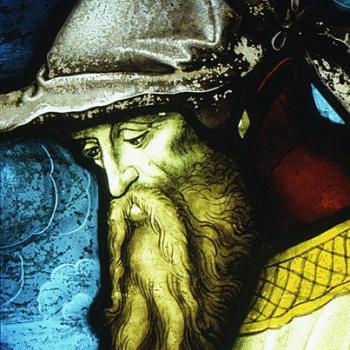
Prophet Isaiah, by Antonio Balestra (1666-1740) [public domain / Wikimedia Commons]
***
(4-9-06)
*****
Doctrine was much less developed in Old Testament times. They didn’t have the Holy Spirit as we do, or the full revelation of the New Testament and the gospel. Therefore, apostolic succession and the protections of infallibility are now possible and thinkable and believable.
The new covenant brought about a major increase of certainty and ability to ascertain spiritual truth in all things. Yet strong notions of authority were present in the old covenant, too, notwithstanding sinners and corruption (as always; nothing new there).
Protestants can talk about sin and corruption all they like, but that doesn’t wipe out the necessity of authoritative teachers, or the fact that this is the norm prescribed by this same Bible that they want to make the sole final (infallible) authority.
What does King Josiah do as soon as the Torah is found (2 Kings 22-23)? He gets the priest. The priest goes to the prophetess. Here are the two teaching authorities. And that is our question at hand. Who had authoritative teaching authority? The king abided by the advice of his advisers, just as Saul ignored Samuel, to his peril (but should have followed his sage advice), and David eventually heeded Nathan’s advice (but tragically too late to avoid the civil war led by his son).
Nor does the fact that the Law as a whole needed interpretation rule out the possibility that certain parts of it were clear and apparent without the need for much interpretation (just as with the Bible as a whole). Catholicism does not require a totally obscure Bible at all. This is a myth. I would argue that the portions that Josiah chiefly acted upon were of such a nature.
How hard is it to understand that idols were contrary to the Law? That’s a no-brainer, so he could see that right away, because it was repeated so often. There is some monstrosity up on a hill that some folks are using in connection with worship. Knock it down; it is an idol. How hard was it to figure out that Passover should be observed? Etc., etc.
Does it thereby follow that the entire Law and Bible could be understood without the need of authoritative teachers? No. And that is rather obvious to this day. Protestants continue to absurdly claim that the Bible is perspicuous, yet fail to agree amongst themselves. And their reasons for why this is (stupidity or sin on the other guy’s part) is as absurd and silly as the original false premise.
The Torah was ineffective when the priests and Levites were lax in their duty to properly teach and interpret it. No argument there. But this is self-evident, and not a contradiction of the Catholic position at all.
As for false priests and prophets: Jesus issued just as devastating criticisms of the Pharisees, yet He commanded His followers to abide by their teaching. So He must have been teaching some notion that the truth could be passed down despite the corruption, not that it was impossible because of the corruption, as many Protestants seem to think. I wrote in my book, The Catholic Verses (p. 50):
Paul shows the high priest, Ananias, respect, even when the latter had him struck on the mouth, and was not dealing with matters strictly of the Old Testament and the Law, but with the question of whether Paul was teaching wrongly and should be stopped (Acts 23:1-5). A few verses later Paul states, “I am a Pharisee, a son of Pharisees” (23:6) and it is noted that the Pharisees and Sadducees in the assembly were divided and that the Sadducees “say that there is no resurrection, nor angel, nor spirit; but the Pharisees acknowledge them all” (23:7-8). Some Pharisees defended Paul (23:9).
So we see that Paul accepts (at least to some tangible degree) the authority of the corrupt priests, just as Jesus accepted the authority (and taught others to do so) of the very Pharisees that He elsewhere excoriated. In fact, right after He says to “practice and observe whatever they tell you” (Matthew 23:3), He launches into His famous denunciations [for hypocrisy] for the rest of the chapter.
Jesus and Paul see nothing improper at all in the concept of a corrupt teacher preserving true teaching. They don’t think that the corrupt teacher loses all authority. So once again we have the biblical teaching, Protestant teachings that contradict it, and the Catholic teaching which is harmonious with it.
Quoting the authoritative words of a true prophet about the foibles and wickedness of false prophets doesn’t proves that prophets have no teaching authority (!). Prophecies had to be proven by future events. If what they said did not come to pass, and they claimed they had a word from the Lord, then they were to be stoned as false prophets. But there was always a true prophet, despite all the false ones.
We can’t plausibly argue that the presence of false prophets rules out any prophets at all, functioning as a primitive “magisterium” for the Jews. Protestants often highlight the wicked guys. But Israel had Jeremiah and Ezekiel and Isaiah and all the rest to tell them the truth. Many did not heed that truth or accept their authority. What else is new? That’s the same as always. Not all (not even a majority) listened to John the Baptist or Jesus Himself, either. And what does that prove? Exactly nothing, as to whether they possessed authority to teach or not, and bind others to their teaching.
Protestants, since they can’t figure out many theological truths, and must fight interminably, have to necessarily take a pessimistic view of things, and analogies from the Old Testament must needs be pessimistic. Therefore, they look at the corruption and all the nonsense that went on in ancient Israel, conclude that authoritative teachers are not to be had, and say that therefore, the chaos in Protestantism is justified because that is how it has always been. And so the individual is thrown upon himself as his own authority (a spectacle every bit as horrifying — if not more so — as having to weed through 17 false prophets to get to a true one).
It’s as if there is no Holy Spirit, no further guidance, no death of Jesus on the cross (in terms of making a difference as to men’s ascertaining of truth). There is no apostolic deposit that we can know and identify, and no succession so that folks could identify the one Church with the one faith.
We don’t say that the age of the Church is no more advanced than all the tragic Jewish history which was corrupt far more than it was righteous and the way God intended it to be. No!; the Christian has faith that because Jesus died and made it possible to obtain the graces of baptism and the Eucharist, and to be indwelt by the Holy Spirit, that now we can know what Christian truth is.
St. Paul certainly presupposes this in his writing, constantly referring nonchalantly (as if it were self-evident) to the one true tradition, received, and passed along. Yet Protestants want to live in the relative uncertainty of the Old Testament times? I find it amazing. But what else can a Protestant do, after all? They are bound by their own self-defeating, endlessly self-contradictory system(s).
I have granted that we don’t have apostolic succession per se in the Old Testament (it obviously did not because of the constant upheavals, decadence, judgments, and subsequent revivals of ancient Israel), but have argued that it doesn’t affect the analogy of Catholicism to the Old Testament system, precisely because we would expect this, based on the Holy Spirit not yet being given to the Church, to guide her.
A sort of “practical infallibility” or simply authority beyond a simple sola Scriptura conception, is certainly present in the Old Testament, and was God’s intention for Israel. It just wasn’t continuous, because of human sin. The Church Age and the coming of the gospel and the Holy Spirit made that possible, because of its supernatural protection, which alone would suffice to accomplish it. We see that in Levites and prophets alike.
A book (assuming it is copied accurately) is not subject to the corruptions and vicissitudes of human nature. It is what it is. So the books sat there and Josiah found them and God’s Law was again known because it could be read. This doesn’t prove sola Scriptura. All it proves is that Israel wasn’t faithful to God and His Law, which we all knew, as this is the overwhelming theme of the entire Old Testament.
Simply saying that the teaching system is irrelevant because it didn’t exist in an unbroken, uncorrupted manner for 3000 years or so of Old Testament history does not suffice. Everyone already knows that, and all agree that the Holy Spirit has a lot to do with it. Most Protestants, after all, manage to believe that the medieval Church fell into great darkness, supposedly obscuring the Bible and the gospel, etc., yet somehow the noble Protestant underground managed to keep the flicker going through all those dreary years till prophet Martin Luther could bring us the Bible, gospel, and good ole truth again.
So why is it so difficult for them to apply the same reasoning to the checkered record of Old Testament observance of the Law as God intended? Within Lutheranism today, for example, we have the same situation: mutual anathematizing regarding the more traditional LCMS and WELS vs. large factions of institutionalized pro-abortion, pro-feminist, theological liberalism in the ELCA (as in most Protestant denominations).
Yet LCMS and WELS Lutherans believe that there is a truth preserved one way or another. One has to simply find it. That’s all we are saying regarding the old covenant. But when we understand the actual system instituted by God, it is far more similar to Catholicism than Lutheranism or any form of Protestantism; that’s my argument.
Priests, Levites, and prophets exercised something between binding teaching authority and infallibility. This is no different, analogously, than popes, councils, and bishops in the Catholic Church. Popes can be infallible, and so can councils in agreement with the pope. It’s true that there is not one, absolute figure like the pope, but when one is in the presence of an Ezra or Jeremiah or Samuel, does it really make any practical difference?
Prophets routinely speak what purports to be the word of God, which is a much higher claim than papal infallibility, which is primarily a preventive, or “negative” guarantee, not positive inspiration or “revelation on the spot.” So one could easily argue that the infallibility (or the charism) was even greater, at least in the case of prophets.
It was even said of the Levites in Malachi 2:4-8: “True instruction was in his mouth, and no wrong was found on his lips. He walked with me in peace and uprightness, and he turned many from iniquity. For the lips of a priest should guard knowledge, and men should seek instruction from his mouth, for he is the messenger of the LORD of hosts.”
This is quite strong and has all the hallmarks of infallibility. The only thing missing is the promise of continuity and succession (so of course Protestants hang on that in arguing against Catholic analogies). But all the essentials are there.
*****

















